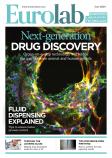Peter Hancock on safeguarding our food and environment through collaboration
We live in a world filled with competing challenges that only grow and become more complex as the population expands. With the global population expected to increase by 2 billion people over the next 30 years, ensuring the future safety and sustainability of our food and water supplies has never been more important. But how do we feed a growing population while simultaneously protecting our environment and natural resources? How do we improve food security while also fostering trade and economic growth?
Waters believes that the answers lie in science and collaboration. That is why in 2018, the company opened the International Food and Water Research Centre (IFWRC) in Singapore to provide researchers access to analytical instrumentation, collaborative lab and office spaces, and funding options to support meaningful projects that enable cutting-edge research into food and environmental concerns. Led by a scientific advisory panel and comprised of experts from academic and industrial fields, the IFWRC supports scientists throughout the world working in areas such as food authenticity, water contamination research, food quality enhancement and new ingredient/formulation studies.
One of the recently completed projects at the IFWRC focused on combating food fraud, which is estimated to cost the global food industry US$30 to US$40 billion per year. Scientists at Mars, one of the world’s leading manufacturers of chocolate, collaborated with scientists at the IFWRC on a project designed to ensure the quality and authenticity of cocoa butter, one of the most valuable raw materials for the chocolate industry. Using rapid evaporative ionisation mass spectrometry (REIMS) and chemometrics, scientists were able to develop a non-targeted, real-time method to discriminate between high- and low-quality cocoa butter. The methodology enhanced the ability of chocolate manufacturers to avoid complex and ever-changing fraudulent activities while guaranteeing the safety and quality of chocolate products.
Tea adulteration is another common food fraud that was the subject of a visiting scientist programme at the IFWRC. As part of that programme, a graduate student from the National University of Singapore, Department of Food Science & Technology studied the authenticity of Chinese oolong tea using the Radian Asap, a novel dedicated direct analysis system specifically designed for rapid, simple, and low-cost analysis of liquids and solids. The hands-on experience allowed the student to discover real-world solutions to combat the economically motivated adulteration of high-value Chinese oolong tea.
As we navigate towards a more sustainable world, the IFWRC is committed to supporting this journey by extending its capabilities to start-ups that share our sustainability goals. TurtleTree, a company based in Singapore and the US, is dedicated to developing the best nutrition from milk in the most sustainable way, using its proprietary cell-cultured technology. The IFWRC collaborated with TurtleTree to develop a test method using ultra performance liquid chromatography quadrupole time of flight mass spectrometry (UPLC/QTof) to help analyse high-value proteins in milk and, in return, gained new insights into novel, sustainable foods options.
With so much focus on feeding the growing population, we can’t overlook the importance of proper nutrition. Abbott Nutrition has been developing innovative nutrition products for nearly 100 years, and today it continuse to provide products that help support the immune system, from infancy through adulthood. Abbott and the IFWRC recently collaborated on the quantitation of human milk oligosaccharides (HMOs). HMOs are key compounds present in human milk, with their concentrations and compositions reported to be closely related to multiple aspects of infant health, including immune support. Through this collaboration, a fast, sensitive, and simple analytical method using liquid chromatography and tandem quadrupole mass spectrometry (LC-MS/MS) was developed to detect and quantitate multiple neutral and acidic HMOs in milk. This new method will help ensure that formulated milk has the necessary proper nutrients to support the long-term well-being of infants.
Collaborations such as the ones highlighted here are just a small sample of the pioneering work being done at the IFWRC. Three years after opening, it has become a destination for knowledge sharing where barriers are removed, and innovative research can flourish. From regulators to private industry, to academia, everyone at the IFWRC is working together to meet the challenges posed by food and water security, sustainability, and nutrition.
Moving forward, future projects at the IFWRC will focus on high growth areas such as alternative proteins, novel ingredients, nutrition science, allergenicity and rapid test development. More information about the IFWRC can be found here.
Peter Hancock is director, Food & Environmental, Scientific Operations at Waters








